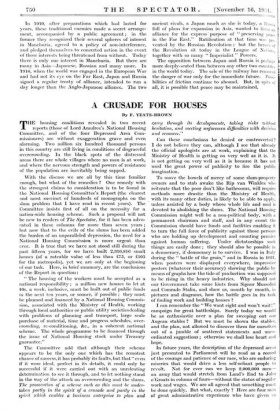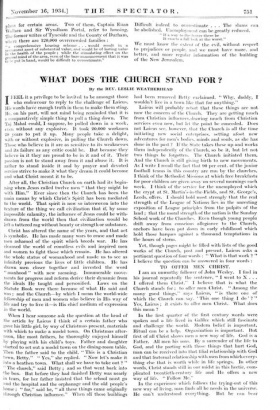A CRUSADE FOR HOUSES
By F. YEATS -BR OWN THE housing conditions revealed in two recent reports (those of Lord Amulree's National Housing Committee, and of the four Depressed Area Com- missioners) arc without exaggeration grave and even alarming. Two million six hundred thousand persons in this country are still living in conditions of disgraceful overcrowding. In the black spots of the distressed areas there are whole villages where no man is at work, and where the nervous strength and powers of resistance of the population are inevitably being sapped.
With the disease we are all by this time familiar enough, but what of the remedies ? One remedy with the strongest claims to consideration is to be found in the National Housing Committee's Report (the clearest and most succinct of hundreds of monographs on the slum problem that I have read in recent years). The. Committee insists first of all on the necessity for a nation-wide housing scheme. Such a proposal will not be new to readers of The Spectator, for it has been advo- cated in these columns for more than seven years ; but now that to the evils of the slums has been added the burden of an unparalleled depression, the need for a National Housing Commission is more urgent than ever. It is true that we have not stood still during the past fifteen years, for we have built 2,310,816 small houses (of a rateable value of less than £75, or £105 for the metropolis), yet we are. only at the beginning of our task. Here, in brief summary, are the conclusions of the Report in question: " The housing of the workers must be accepted as a• national responsibility ; a million new houses to let at 10s. a week, inclusive, must be built out of public funds in the next ten years, or sooner, if possible ; they must be planned and financed by a National Housing Commis- sion, associated with the Ministry of Health, working through local authorities or public utility societies dealing with problems of planning and transport, large scale purchase of material, time and progress schedules, over- crowding, re-conditioning, &c., in a coherent national. scheme. The whole programme to be financed through the issue of National Housing stock under .Treasury guarantee."
The Committee add that although their scheme appears to be the only one which has the. remotest chance of success, it has probably its faults, but that " even if it were ideal, perfect in its details, it could only be successful if it were carried out -with an unrelenting determination to see it through, and to let nothing stand in the way of the attack on overcrowding and the slums. The prosecution of a scheme 'such as this must be under- taken partly in the spirit of a crusade and partly in the spirit which enables a business enterprise to plan and carry through its developments, taking risks without hesitation, and meeting unforeseen difficulties with daisies and resource."
Can these conclusions be denied or controverted ? I do not believe they can, although I see that already the official apologists are at work, explaining that the Ministry of Health is getting on very well as it is. It is not getting on very well as it is because it has not used the great power of publicity to fire the public imagination.
To move the bowels of mercy of some slum-property owners and to stab awake the Rip van Winkles who reiterate that the poor don't like bathrooms, will require methods more drastic than the Ministry of Health, with its many other duties, is likely to be able to apply, unless assisted by a body whose whole life and soul is devoted to abolishing the slums. The National. Housing Commission might well be a non-political body, with a permanent chairman and staff, and in any event the Commission should have funds and facilities enabling it to turn the full force of publicity against those persons who are holding up development and counting pennies against human suffering.. Under dictatorships such things are easily done ; they should also be possible in a democracy, if democracy is to survive. I was in Italy during the " battle of the grain," and in Russia in 1931, when posters were displayed everywhere, impressive posters (whatever their accuracy) showing the public by means of graphs how the tide of production was supposed to be rising in the heavy industries. Why should not our Government take some hints from Signor Mussolini and Comrade Stalin, and show us, month by month, in pictures and diagrams, how the battle goes in its task of finding work and building houses ?
I can remember the "We want eight and won't wait!" campaign for great battleships. Surely today we would be as enthusiastic over a plan for sweeping out our Augean stables ? But we must be shown the stables, and the plan, not allowed to discover them for ourselves out of a jumble of scattered statements and unco- ordinated suggestions ; otherwise we shall lose heart and hope.
In future years, the description of the depressed areas just presented to Parliament will be read as a record of the courage and patience of our race, who are enduring miseries that would drive a less self-reliant people to revolt. Not for ever can we keep 2,000,000 men— an army that would stretch from Land's End to John o'Groats in column of fours—without the status of regular work and wages. We are all agreed that something must be done quickly. But what, exactly ? Here are four men of great administrative experience who have given us plans for certain areas.• Two of them, Captain Euan Wallace and Sir Wyndham Portal, refer to housing. The former -writes of Tyneside and the County of Durham, where there are 120,000 overcrowded families :
"a comprehensive housing scheme . . . would result in a permanent asset of substantial value, and would be of lasting value w the health of the people ; while the stimulating effect on the general mind of the area, even of the bare announcement that it was to be put in hand, would be difficult to overestimate."
Difficult indeed to overestimate . . . The slums can be abolished. Unemployment can be greatly reduced.
" If a way to the better there be It exacts a full look at the worst."
We must know the extent of the evil, without respect to prejudices or people. and we must have more, and better, and more regular information of the building of the New Jerusalem.







































 Previous page
Previous page